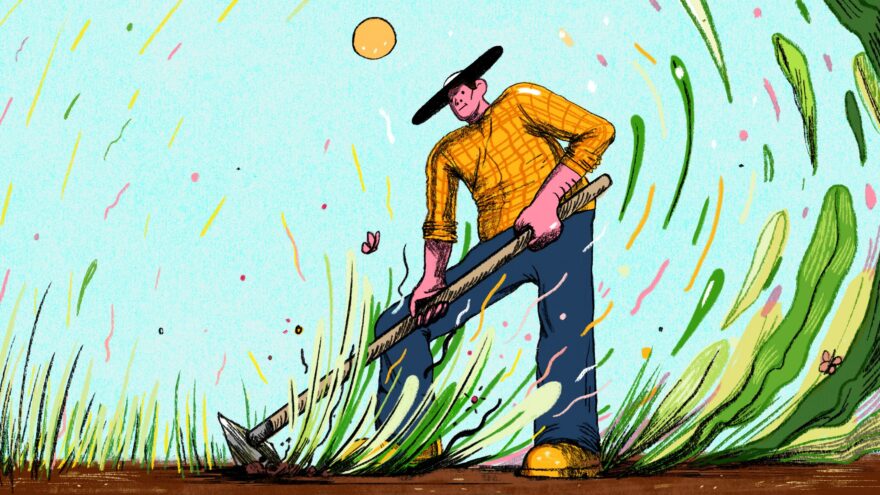During a late May morning on a farm on the outskirts of my hometown of Concord, New Hampshire, I join the other farmhands in walking down the row of Fraser fir Christmas trees, two years old and barely up to my knees, sprinkling pellets of fertilizer around the outer edge of the lower branches.
Take two steps.
Repeat.
Two steps.
Repeat.
When we reach the end of the row, we fill up our plastic pails with fertilizer and journey back up the gently sloping hill. Upon reaching the top, the farmer, a 40-something, broad-shouldered hockey player—who can fix everything, from backhoes to weed wackers—gives us a reminder.
“Make those roots reach for the nutrients,” he tells our crew of four, including me, a retired Army veteran, and two local college students.
I embrace the repetitive and meditative work. It’s hot in the bright sun, but there’s a breeze that cools the sweat just enough to make it bearable. I’m working for wages a fraction of my previous job, but the rewards make up for the loss in pay. The work is a constant reminder that using my hands and body, feeling accomplished after seeing tangible results, is something that many folks of my generation are—or perhaps should be—longing for.
I’m well aware that my choice of part-time employment comes from a position of privilege. I don’t have to work 40-plus hours a week spreading fertilizer, pulling weeds, and straining my body day after day. My wife, Rebecca, carries our benefits, and after some international travel, we’re living at home with my dad in my childhood home. And yet I’ve always enjoyed physical work.
My summer jobs during high school and college included working for a moving company, preparing textiles and rugs for shipping, and stacking pallets of beer by night in a refrigerated warehouse.
After graduating from Middlebury in 2004, I worked as a public school teacher in Kentucky, but I didn’t stop embracing activity that was grounded in making and doing.
During afternoons and evenings, I experimented and toiled in my urban garden, keeping a small flock of hens that our neighbor would sometimes find roaming in the alleyway or hiding underneath his pickup truck. I brewed beer and hunted white-tailed deer on weekends and evenings, learning to do everything from calibrating my compound bow to scouting for tracks and field dressing the carcass.
It all served as a salve for teacher stress, a respite from grading papers, angry parents, and having to make thousands of decisions every day in the classroom. I suffered from bouts of depression, but when I was moving and outside, I activated a different part my brain. The disconcerting fuzz of radio static in my head dissipated with every pulled weed.
Earlier during that May morning at the farm, our crew labors over pruning highbush Jersey blueberries. The morning dew saturates my work boots, and by 9 a.m. I shed my thin outer layer. After we pile the discarded branches at the end of the rows, our boss deftly handles the bucket loader as he maneuvers and mashes the small mountain of tangled branches, scoops them up, and reverses course to dump the limbs in the corner of a field for what will undoubtedly become a bonfire on a cool fall evening.
Before we start fertilizing the infant Christmas trees, I take a moment and think about what a friend and fellow Middlebury grad told me earnestly after I informed him about my farmhand work. “It’s going to be good for the soul,” he said. So far, he’s right.
And I can’t help wondering just how much better off many of us would be—physically, mentally, and spiritually—if we valued healthy doses of active work as much as the countless jobs that require sitting still, staring at a screen, and hoping that our emails and mouse clicks have a measurable and positive impact on the world around us.

Leave a Reply